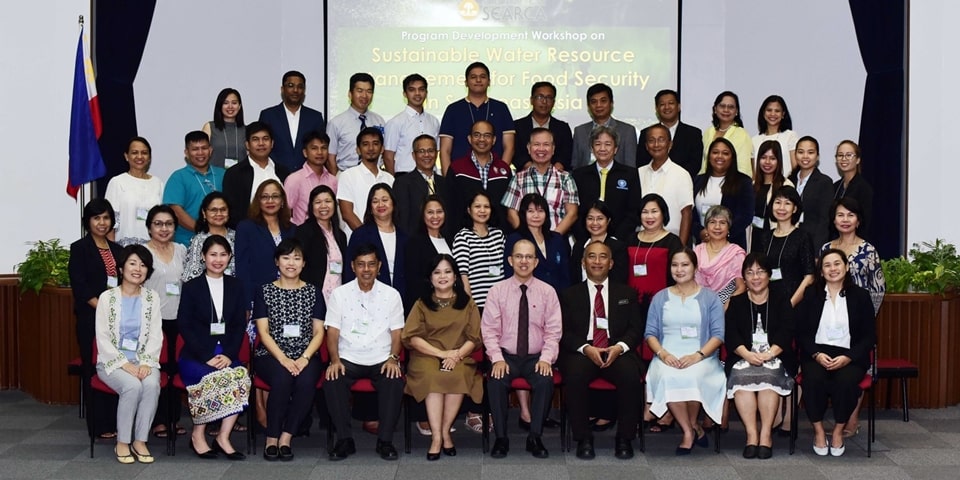Background and Rationale
Water in agriculture plays a vital role in global food security. In most regions of the world, over 70 percent of freshwater is used for agriculture. By 2050, feeding a planet of nine billion people will require an estimated 50 percent increase in agricultural production and a 15 percent increase in water withdrawals (Khokhar, 2017)1. Growing this extra food for the additional 1.5 billion people who will live on the continent by 2050 will require better management of existing irrigated lands, since opening up new frontiers is constrained by lack of land and water resources. This scarcity is also driven by urban expansions, expanding energy and industrialization and further exacerbated by climate change and natural resource degradation. In the face of competing demands for water by various users, agriculture will need to produce 60 percent more food globally by 2050, and 100 percent more in developing countries using diminishing water resources2.
With increasing concerns about water scarcity and food security in the region, the prospects of tapping new water supply sources to generate additional areas with irrigation facilities is small, partly due to the limited number of water resources that are economically feasible for irrigation development. Most of the productive water resources, that is, rivers with perennial, big annual flows in suitable locations for development, have been tapped since the twentieth century for purposes of irrigation, urbanization and energy generation. Moreover, most of the productive water resources are now practically fully allocated or even over-allocated.
Given this scenario, the major concern for agriculture sector is finding ways to produce more food with the declining share of water resource. More sustainable and resilient agriculture to support food production is required. Investments for water and food security in the region are needed to provide farmers and farming communities with a viable economic future.
This workshop reviewed current initiatives toward sustainable water resource management for food security in Southeast Asia in order to distill needs and gaps that research and development, capacity building, and knowledge management may address. An umbrella program that could serve as a platform for collaboration across participating institutions and other partners working in Southeast Asia was hoped to be developed.
Objectives
- Take stock of research, policy, and initiatives, along with institutional interests, towards sustainable water resource management systems for food security in ASEAN / SEAMEO member countries;
- Identify needs and gaps that research and development, capacity building, and knowledge management need to address toward sustainable water resource management systems for food security in ASEAN / SEAMEO member countries; and
- Propose an umbrella program that will provide a platform for and strengthen coordination, networking, and collaboration in research and development, capacity building, and knowledge management toward sustainable water resource management for food security in the Southeast Asian region.
Intended Participants
Representatives of the Ministries/Departments of Agriculture and national water and irrigation related agencies in the Southeast Asian Region; representatives of relevant regional or international organizations in Southeast Asia; irrigators' associations and small water-impounding system associations (SWISAs); local government units; researchers; academe; and farmer associations.
Desired Outputs/Outcomes
- Levelling-off among partners and participants on the state, needs, gaps, and immediate concerns toward sustainable water resource management for food security
- Draft umbrella program for collaboration in the region
- Proceedings and briefs harvested from presentations as may be relevant
Workshop Agenda
| Day 1 |
|---|
| Registration |
| Opening Program and Workshop Overview |
| Keynote Presentation |
| Country Reports: State of Water Resources Planning and Management |
| Session 1: Managing high variability of water supply in agriculture |
| Session 2: Integrated River Basin Management: Challenges and Cooperation |
| Cocktails and Welcome Dinner |
| Day 2 |
| Recap of Day 1 |
| Session 3: Modernizing agriculture for improved crop and water productivity |
| Development Partners' Forum: Opportunities for Funding and Collaboration in Sustainable Water Resource Management for Food Security Panel presentations by interested partners for the umbrella program |
| Session 4: Policy support to water security in agriculture- database, management at the national level, investments, governance |
| Workshop 1: Priority Areas and Gaps in Research and Development, Knowledge Management and Capacity Development Participants will distill the priority areas and gaps that can be drawn from the four thematic sessions and draw up the relevant themes, directions, and possible initiatives for the umbrella program |
| Day 3 |
| Recap of Day 2 |
| Workshop 2: Crafting an Umbrella Program on Sustainable Water Resource Management for Food Security Facilitated discussion to distill and refine a draft umbrella program on sustainable water resource management for food security |
| Wrap-up |
| Presentation of Key Points of the Proposed Umbrella Program and Sealing of Commitments and Immediate Actions |
| Evaluation |
| Closing Program |
| Acknowledgements |
Additional Information
News
Workshop toward sustainable water resources management held
For details, please contact:
1 Khokhar, Tariq, Globally, 70% of Freshwater is Used for Agriculture, The Data Blog, https://blogs.worldbank.org/opendata/chart-globally-70-freshwater-used-agriculture
2 World Agriculture Towards 2030/2050, The 2012 Revision, ESA Working Paper No. 12-03 June 2012, Food and Agriculture Organization
